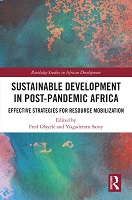Sustainable Development in Post-Pandemic Africa
Proposal review
Effective Strategies for Resource Mobilization

Contributor(s)
Olayele, Fred (editor)
Samy, Yiagadeesen (editor)
Language
EnglishAbstract
With both domestic and external financing expected to dry up in the wake of the COVID-19 pandemic, this book argues that there is a need for fresh ideas and new strategies for achieving sustainable development in Africa. In addition to triggering the most severe recession in nearly a century, the COVID-19 pandemic has disrupted global value chains, causing unprecedented damage to healthcare systems, economies, and well-being, hitting the world’s most vulnerable people the hardest. Even before the pandemic, Africa was suffering from the effects of low commodity prices, sluggish GDP growth, high debt levels, low levels of domestic savings, and weak private capital inflows. This book argues that now, as the continent emerges from the current crisis, it will be important to reconfigure current financing sources under a forward-looking framework that incorporates other non-traditional financing tools and mechanisms such as public-private partnerships, sovereign wealth funds, gender lens investing, new growth drivers, and emerging and disruptive technologies. Finally, the book concludes by adopting a sectoral approach and examining the real economy impacts of new growth drivers such as agriculture value chains, industrialization, tourism, and the blue economy. Drawing on a range of original research as well as insights from practice, this book will be a useful guide for Global Development and African Studies researchers, as well as for policy makers, investors, finance specialists, and global business practitioners and entrepreneurs.
